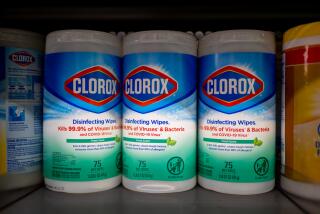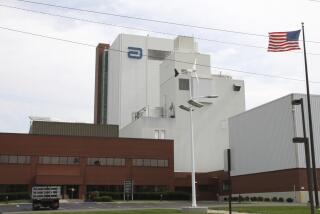Vaccine Delays Hit Chiron’s Recovery
Chiron Corp., the company responsible for last year’s flu vaccine shortage, said Friday that it would not ship 8 million doses slated for non-U.S. markets because of another bacterial contamination incident, this time at a German factory.
The Emeryville, Calif.-based company also disclosed that it would need additional approvals before shipping vaccine to the U.S. from its factory in Liverpool, England. Analysts said this meant deliveries could be delayed until late in the flu season.
Last year, Chiron destroyed 52 million doses -- half the total U.S. supply -- after British regulators found contaminated vaccine produced in Liverpool.
Some analysts reduced their earnings forecasts Friday. Geoffrey Porges of Sanford C. Bernstein & Co. called the latest news troubling and said management changes were needed to resolve Chiron’s problems. “They are swamped with bad news,” he said.
Investors also were critical. Chiron shares slid $1.24 to $36.03.
The plant in Marburg, Germany, makes Begrivac, a flu vaccine sold in Germany and England. The company said it found low levels of the bacterium Paenibacillus glucanolyticus in six lots of vaccine during routine testing.
Chiron said that it believed the contamination was confined to those six lots and that it was working with German regulators to resolve the problem.
Because of resulting delays, the Marburg factory can produce only 4 million doses instead of 12 million, Chiron said. The company hoped to make up the shortfall by producing additional doses at a Chiron flu vaccine plant in Siena, Italy, spokeswoman Alison Marquiss said.
About 5 million shots, or one-quarter of the 20 million doses distributed in Germany last year, were supplied by Chiron’s European factories.
“We hope that the flu shot shortage will not affect the overall availability in a serious way, and we do not see a crisis,” said Susanne Stocker, a spokeswoman for the Paul Ehrlich Institut, Germany’s counterpart to the U.S. Food and Drug Administration.
Chiron’s problem in Marburg is reminiscent of last year’s troubles in Liverpool. Chiron revealed in August that 4 million doses of Fluvirin vaccine were contaminated, but that it expected to ship 46 million to 48 million shots for that year’s season anyway. Two months later, however, British regulators suspended Chiron’s manufacturing license, citing bacteria contamination and poor production practices, and the entire production run was scrapped.
The company’s problems also triggered investigations by the U.S. Justice Department and the Securities and Exchange Commission.
Chiron initiated a massive overhaul of the factory and won reinstatement of its license in March. But it must pass FDA inspection in order to ship vaccine to the U.S. this year. And, the company said Friday, the FDA also must approve the vaccine itself because the manufacturing changes were so extensive. Chiron said the process should take several weeks.
The company said it still expected to ship vaccine from September to November. But analysts said Friday’s news suggested the regulatory approvals could be more drawn out than previously thought.
Porges, the Bernstein analyst, said it was likely that some shipments would be delayed until December because of the need for supplemental product approvals. That would mean Chiron could have trouble selling its vaccine if the flu season was mild. Porges said there was a 20% to 25% chance that Chiron would ship no vaccine to the U.S.
Although Chiron said its earnings would not be affected, some analysts disagreed and lowered their forecasts. Porges said he expected Chiron to earn 10 cents to 20 cents less than the $1.10 a share he had estimated for 2005.
Thomas Wei of Piper Jaffray lowered his estimate by 9 cents to $1.20. He said he assumed no sales of vaccine produced at the Marburg plant.
In another disappointing turn for the company, Chiron said the FDA asked for another study of Pulminiq, an experimental drug for lung transplant patients. The agency’s request wasn’t a surprise because an advisory panel was split last month over the drug. Chiron said it was reviewing its options.
More to Read
Inside the business of entertainment
The Wide Shot brings you news, analysis and insights on everything from streaming wars to production — and what it all means for the future.
You may occasionally receive promotional content from the Los Angeles Times.










